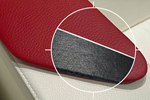Volkswagen unveils hemp fiber-based leather alternative with Revoltech
Bio-based surface material made from industrial hemp is being developed and tested for possible use in Volkswagen vehicles from 2028 onward.
Source | Volkswagen Group
(Wolfsburg, Germany) has entered into a cooperation with the textiles manufacturer startup (Darmstadt, Germany) to research and develop sustainable materials based on industrial hemp — specifically, a substitute for imitation leather. These could be used as surface materials in Volkswagen models starting in 2028.
The leather alternative is made from 100% bio-based hemp cultivated for the food industry. It is an all-natural, single-layer surface material called LOVR (“leather-free, oil-free, vegan and residue-based”) that is being developed specifically with the automotive industry in mind. It can reportedly be produced in existing industrial plants and recycled or composted at the end of its service life. The hemp fibers and a fully bio-based adhesive are combined using a distinctive technology and processed to become a surface material.
According to Kai Grünitz, Volkswagen brand board member for technical development, “In our search for new materials, we are very open to new ideas from many different industries. At Technical Development, we place a strong focus on innovative, creative and sustainable solutions for holistic, resource-saving vehicle development.”
Moreover, the cooperation between Revoltech and Volkswagen provides a good example of benefits gained when startups and established companies work together using their respective strengths.
Volkswagen’s Materials Technology, Design and Components Development departments, Volkswagen Group Innovation and Revoltech are combining know-how to include as many perspectives as possible in the material’s development. Potential applications are being identified in collaboration with Components Development. The material has received very positive feedback in customer surveys.
Related Content
-
SMC composites progress BinC solar electric vehicles
In an interview with one of Aptera’s co-founders, CW sheds light on the inspiration behind the crowd-funded solar electric vehicle, its body in carbon (BinC) and how composite materials are playing a role in its design.
-
Creating a composite battery insert-stud solution for EV trucks
Bossard worked with an OEM and Tier supplier team to meet tight electrical insulation and packaging tolerances while reducing tooling, molding and assembly costs.
-
Infinite Composites: Type V tanks for space, hydrogen, automotive and more
After a decade of proving its linerless, weight-saving composite tanks with NASA and more than 30 aerospace companies, this CryoSphere pioneer is scaling for growth in commercial space and sustainable transportation on Earth.






